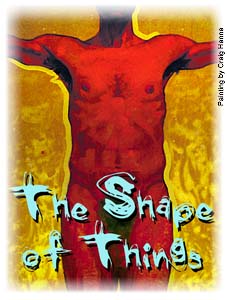
HONORS 1110 Spring 2006
Weeks 11-12

In LaBute's play, The Shape of Things, he turns
the gender tables around--it is a woman exploiting a man this time. Evelyn, an
artist and graduate student, seduces Adam, and, with him in her thrall, proceeds
to convince him to take various self-improvement steps: he changes his
hairstyle, he starts going to the gym and losing weight, he changes his style of
dressing, he gets contact lenses, he even has cosmetic surgery. The earlier
steps seem positive--who could argue with healthy self-improvement? The nose
job, though, takes it all a step further. Surgery purely for vanity's sake, as
widespread as it is, raises fundamental value questions. Evelyn has engaged
Adam's vanity to her own purposes, but the vanity is his: he has been corrupted.
The choice of names--Adam and Evelyn--announces rather obviously:
Biblical parable here! (There's even an apple offered.) Adam resists the
surgery, further indicating that things have gone beyond self-improvement and
into issues of manipulation and control. And when Adam dallies with his friend
Jenny, who is engaged to his former roommate, Evelyn makes him choose between
them and her.
As it turns out, she's even worse than that. Evelyn has been using Adam all
along. He is the subject of her "art," a piece of conceptual art, if you will,
for her master's thesis. Every artifact she has collected from Adam, every
conversation they've had, every videotape of their sex together, all the
documentation of the behaviors she has used her wiles to elicit from him were
unfeelingly, clinically collected and are now put on display in a gallery.
LaBute gives Adam a chance to castigate Evelyn (likening her work to Nazi
lampshades), but that final scene seems anticlimactic. Once the audience knows
what she has been doing, the implications need not be spelled out.
LaBute has extended his argument beyond the loss of innocence into the role
of the artist in society, but surely he doesn't mean to suggest that all
artists are immoral and heartless parasites. Maybe it's an expression, as
well as a defense, of his own self-questioning as an artist, and the quandary
that his particular style presents. Before we know what she is up to, he has
Evelyn say about art: "It's a visceral thing. You've got to feel it. Love it,
hate it--it isn't a casserole." (Source:
The Culture
Vulture)
 Neil
LaBute was born in Detroit, MI, on March 19, 1963. When LaBute was a child, his
family moved to Spokane, WA, and during his high school days in the Pacific
Northwest he developed a keen interest in both writing and theater. After
graduating from high school, LaBute received a scholarship from Brigham Young
University, a college in Provo, UT, which was founded and is still overseen by
the Church of Jesus Christ of Latter-day Saints, known to many as the Mormons. LaBute received a degree in Theater and Film at B.Y.U., and converted to the
Church of Jesus Christ of Latter-day Saints while a student. LaBute went on to
graduate work at the University of Kansas and New York University, and
participated in a writing workshop at London's Royal Court Theatre, as well as
attending the Sundance Institute's Playwright's Lab at N.Y.U. LaBute first began
writing and staging original plays while studying at Brigham Young, and in 1993
he returned to B.Y.U. to premier his drama In the Company of Men, a
startling and controversial tale of two businessmen who conspire to emotionally
destroy a receptionist at their firm.
Neil
LaBute was born in Detroit, MI, on March 19, 1963. When LaBute was a child, his
family moved to Spokane, WA, and during his high school days in the Pacific
Northwest he developed a keen interest in both writing and theater. After
graduating from high school, LaBute received a scholarship from Brigham Young
University, a college in Provo, UT, which was founded and is still overseen by
the Church of Jesus Christ of Latter-day Saints, known to many as the Mormons. LaBute received a degree in Theater and Film at B.Y.U., and converted to the
Church of Jesus Christ of Latter-day Saints while a student. LaBute went on to
graduate work at the University of Kansas and New York University, and
participated in a writing workshop at London's Royal Court Theatre, as well as
attending the Sundance Institute's Playwright's Lab at N.Y.U. LaBute first began
writing and staging original plays while studying at Brigham Young, and in 1993
he returned to B.Y.U. to premier his drama In the Company of Men, a
startling and controversial tale of two businessmen who conspire to emotionally
destroy a receptionist at their firm.
In 1997, LaBute decided to adapt In the Company of Men for the screen, and on a budget of only 25,000 dollars, shot the film in two weeks in and around Fort Wayne, IN, with a friend from his college days, Aaron Eckhart, who played Chad, one of the businessmen. In the Company of Men was accepted at the 1997 Sundance Film Festival, and to LaBute's surprise, it won the Filmmaker's Trophy as Best Dramatic Feature; the film was picked up for national distribution, and went on to gross 2.9 million dollars.
Following the success with In the Company of Men, LaBute next wrote and directed Your Friends & Neighbors, an examination of the sexual and emotional failings and frailties of three couples; it was also based on one of LaBute's earlier plays, entitled Lepers. Shot on a relatively lavish five-million-dollar budget, Your Friends & Neighbors, while not as widely acclaimed as In the Company of Men, received solid reviews and confirmed his status as an exciting new talent in filmmaking. LaBute was also one of several new filmmakers chronicled in the documentary Independent's Day.
In 2000, LaBute refocused his attentions to the stage with Bash: Latterday Plays, a collection of three short plays (which, like his two films, was adapted from a previous LaBute stage production entitled Bash: A Gaggle of Saints). Bash, starring Calista Flockhart and Paul Rudd, proved to be a hot ticket in its New York off-Broadway run, and a performance of the play was taped for later broadcast on the Showtime premium cable network. That same year, LaBute released his third feature film, which was also his first film which he did not write -- Nurse Betty, a dark but sweet comedy about a slightly touched woman chasing her dreams after the murder of her husband, while being followed by the gunmen who did in her spouse. Nurse Betty proved LaBute could work with a lighter touch, and became a respectable box-office success. LaBute's next project, Possession (2002), was another departure for him, in that it focused mainly on romance and elements of period drama. After that, he returned to the themes of his earlier films, writing and directing The Shape of Things (2003), which he had originated as a play in London. When not busy with his work, LaBute lives with his wife and two children in Fort Wayne, IN. (Source: All Movie Guide)
Readings:
 (2003) R for language and some sexuality
(2003) R for language and some sexualityResponse paper #5: Neil LaBute's text is an update of George Bernard Shaw's Pygmalion. Evelyn, wiser, smarter, more confident and determined than the amiable Adam, sets out to see how far she can change him. But is it for the better, and does even she have any idea how her efforts will turn out? What are issues about interpersonal relationships and manipulation which Labute raises for you?